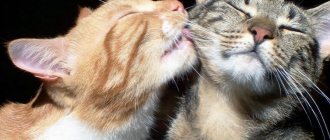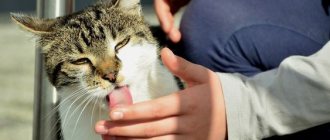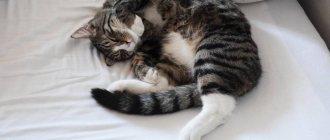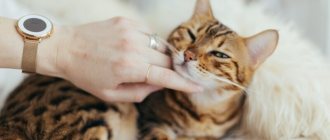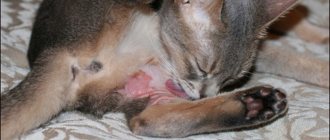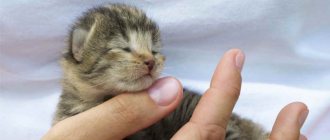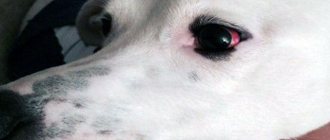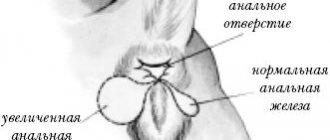A dog licking your hand is normal. This is how they show affection. However, with a cat it is a completely different matter. These felines aren't exactly known for their licking, so it's a little strange when they start licking our hands and fingers a lot.
Luckily, this is fairly harmless behavior. This is usually a sign of affection, although it can mean other things. Let's look at some of the most common reasons why this behavior occurs, and what you can do about it.
Social connection
When two cats like each other, they often exchange licks. This usually happens through grooming, but this is not always the case. For example, mother cats lick their kittens, which helps create a social bond. This is a cat's natural reaction to liking someone.
However, such licking is not only allowed for pet owners. Many cats will also lick other animals and felines in the house, especially if they love to lick.
© shutterstock
Some cats love to lick more than others. Just because a cat doesn't lick doesn't mean it doesn't like you. It seems to be mostly a personal thing: some cats lick a lot, while others don't lick at all.
False maternal care
The first emotion a newborn kitten receives is maternal affection. Being blind and deaf, he feels a connection with his mother through tactile touches and then carries these feelings throughout his life. The cat, in turn, licks the kittens' bellies, pursuing other goals - it stimulates digestion and at the same time calms the babies, helping them relax and fall asleep. When a kitten is separated from its mother very early, it instinctively reaches out to a person, transferring its desire for love and care into adulthood.
Animals become especially vulnerable during puberty. If a cat is not sterilized on time and does not give birth, she may develop a so-called false pregnancy. If there is a close attachment to the owner, she has no choice but to “practice” her maternal instincts on a person. Hormonal imbalances often occur in non-castrated cats, which also begin to behave overly affectionately.
Important: in order not to provoke hormonal imbalance and subsequent health problems in your pets, it is advisable to carry out the procedure of sterilization or castration before the age of one year.
Stress
Some cats also lick their hands when they are stressed. It looks like a nerve tick. Your cat may begin to lick excessively, including your fingers. This behavior can also cause your cat to overgroom itself, which basically involves licking a part of its body so much that it begins to lose hair. They may also lick objects such as the floor or sleeping area.
Stress is not always a sign of something serious. Cats experience stress for a variety of reasons. Perhaps your daily routine has changed and this is making your cats nervous. However, sometimes cats can become stressed due to illness. They usually hide their symptoms very well, so you probably won't even know that anything is wrong.
If you notice that your cat is licking his hands too much, keep an eye out for other strange behaviors too. They could indicate that something more serious is going on.
Begging
The answer to a cat's atypical behavior may be hidden in a banal begging for food. In most cases, this manner of communication with the owner is typical for older kittens raised on artificial feeding. They associate human hands with food, so licking and biting palms seems absolutely normal and natural to them. Often, hand licking is accompanied by a movement that imitates kneading of the front paws. The reaction is automatic and reflects the memory of the kitten squeezing milk from its mother's nipples.
Your hands taste like food
If you've just eaten, your cat may still be able to taste the food on your hands. This may lead to the feline licking your hands simply because they taste good. You can usually tell whether this is the cause of your cat's behavior based on the circumstances.
Even cats that don't seem to engage in social activities will lick your fingers because they taste good.
© shutterstock
Boredom
It happens that the owners are busy with their own affairs all day long, and when they come home, the cycle of household chores begins. And the animal patiently waited for the owner to return all day long to communicate. For humans, communication is present everywhere, but cats are often alone for long hours. Similar phenomena can occur if people are close to the animal and pay little attention to it.
By licking a person's hands, a cat asks, and sometimes even demands, attention to it. If your pet has frequent attacks of wanton hand licking, then try spending more time playing with the animal. Stroking the fur and scratching behind the ears will not be amiss.
Hands taste like something else
Even if you haven't eaten anything tasty, your cat may like the taste of something on your hands. This may include lotion and soap, which some cats enjoy. Soap and lotion are usually made from animal fats. Those with higher numbers may be more prone to licking.
Of course, cats tend to only like certain soaps and lotions. Not every soap or lotion will suit everyone. Thus, it is not uncommon for a cat to lick your fingers only after you have applied a certain lotion or soap. They like one and not the other.
How to wean
Even understanding the “train of thought” of a cat, why it licks a person’s hands, face, head and other parts of the body, it is not always pleasant to endure such caresses. And if all this happens in the presence of strangers, then it is even more inappropriate. To wean an animal from such a habit, under no circumstances should you shout at it or be rude. It is better to use one of the following methods:
- Distract with a game. Having switched to something active and interesting, the cat will no longer so insistently demand attention.
- Buy a scratching post and teach your pet to use it for its intended purpose. Catnip is commonly used as bait.
- Appear busy or distracted by going into another room as soon as the animal begins to show signs of excessive “love.”
- Try wearing a fur glove on your hand if your cat likes to lick your palms. Over time, she will get used to the glove and will train on it, and will leave the person alone.
Be that as it may, having made a meowing friend at home, you need to gratefully accept all his affection and love, even if the form of its manifestation is not very pleasant and persistent.
Attention
Some cats may lick their hands to get attention. Usually it's just one click. Then your cat will sit back and stare at you. This usually means they want to be petted or held. However, it could also mean that they need you for something else, such as opening the door or refilling their food dish.
© shutterstock
This licking is clearly different from other types. In most other cases, the cat is going to lick you several times. However, licking when they want attention is only a means to an end, so they will stop licking when they get what they want.
Reasons for licking, which indicate poor physical and mental condition of the pet
- Boredom. It happens when an animal spends a lot of time alone or is not paid attention to.
It is advisable to communicate with the cat as much as possible and play with it daily. - Stress. Unfortunately, people do not always notice that their pet is under extreme stress. In this case, the animal can almost continuously lick the owner’s hands, itself and even things. It is even possible that bald patches may appear on the pet's body, which cannot be distinguished from the manifestations of certain skin diseases. It is advisable to take your cat to the veterinarian as soon as possible.
- Diseases and the presence of parasites. Licking the owner's own body and hands may indicate that the cat is not feeling well - in this way it is distracted from the pain. Don't put off visiting a veterinary clinic.
- Allergy. An incorrectly selected shampoo can cause a cat to lick everything, causing an allergic reaction. It is advisable to use caution not only with care products for your pet’s coat, but also to use household chemicals less often.
Aromatic labeling
A cat can mark something in many ways, their tongue is one of them. Typically, when two cats groom each other, their scents mix. They "tag" each other in the process, and now they both smell like each other.
Your cat may try to recreate this mixture of smells when grooming you. This reason is difficult to distinguish from attachment, mainly because odors usually come from the attachment site as well. Your cat may also knead you, which helps mix your flavors.
Either way, it's mostly a result of your cat licking their hands, although they may act a little differently than you're used to.
Article Author: Kristin Hitchcock Kristin is passionate about helping pet parents create fulfilling lives with their pets by keeping them informed about the latest scientific research and helping them choose the best foods for their pets.
Trying to dominate
Wild cats are capricious, cautious and cunning. These qualities were also inherited by their domestic descendants. If a cat licks your hands when you are at your least protected, this demonstrates its desire to dominate. In a similar way, animals demonstrate their dominant position among members of the community.
Such manifestations may indicate the pet’s intention to be higher than you on the hierarchical ladder.
The language of communication
Mutual licking is a ritual common to all cats. Thus they strive to:
- Demonstrate the anatomy of feelings . By licking the area of the cheeks, arms, ears and chin, the pet seems to be kissing a person and automatically puts an o.
- Show the owner that he is the closest and dearest . Living as a pet outside of communication with its fellow tribesmen, the cat switches its emotions to humans. Grateful for food and care, the pet tries to be as close to the owner as possible in order to rub its cheek or lick an area of exposed skin: face, neck, fingers, ankle. The sincerity of feelings is indicated by closed eyes and a quietly vibrating “internal motor” that turns on in cats at the moment of receiving positive emotions. Some cats love to lick the hair of their owners, hugging their paws around the neck or sitting next to them on a pillow.
In what situations do cats lick their heads?
If you woke up to your tailed pet selflessly licking your head, you can consider several reasons, and the main one is a passion for cleanliness. Probably, the cat considers the smell of shampoo too strong, or simply demonstrates the tenderness that it shows towards its own kittens. One of the reasons for this behavior may be the desire for dominance.
In the same list of reasons for the cat’s interest in the owner’s head, there is also a lack of attention. If this behavior of your furry pet causes discomfort, it is easy to wean her off it with the help of her favorite games and attention. If you can’t retrain your cat on your own, a specialist will always help.
Low self-esteem
Such a “diagnosis” is not uncommon not only in human society, but also in cat society. The animal considers itself the lowest in the pack and by licking its hands makes it clear that it does not claim to be the leader. As a rule, such cats are very constrained, fearful, and also often lag behind in development and get sick. Falling on their backs, they show their defenselessness with all their appearance and lick the owner of the pack. Living in constant stress leads to fears, complexes, suppression of emotions and, ultimately, health problems.
How to rid a cat of the obsessive desire to lick its owner
If hand licking is not associated with pathology, but is caused by the cat’s excessive love for humans, then experts advise doing the following:
- Buy toys for your animal that will attract his attention. These can be either mechanical devices or simple ones, like a fur mouse or a plastic ball with a bell inside.
- Buy catnip at the pharmacy. It is considered a good way to calm an adult cat that is under stress.
- Temporarily do not pick up the animal, but do not drive it away or beat it. When the cat jumps onto the owner’s lap, you need to move him, get up and leave. Gradually, the cat will lose interest in the owner and find a new activity.
- If a cat is undergoing rehabilitation after some illness, but still licks a person’s hands, you should massage his neck or the area along his back. This will relieve tension, calm him down and eliminate the need to lick his lips.
Cats don't just lick themselves to remove dirt. So they massage the glands that secrete a water-repellent oily liquid, and then spread it over the hair with their tongue.
Natural reflex
It is important to know that licking is a natural and unconditioned reflex of absolutely all cats. Intense nose licking occurs at the sight of food
shutterstock
While you are serving food, the cat is constantly swallowing and licking, and this is considered normal.
During sleep, cats may often lick their lips due to the fact that their nose dries out due to dulling of the receptors.
Thirst can also cause licking. The cat must have 24/7 access to water. In hot weather, it needs to be changed several times a day. This is especially true for pets who eat only dry food.
The stress suffered can also be expressed in intense licking of the muzzle, paws or sides. Initially, it may seem that she is itching from fleas. Emotions and various shocks play an important role in the life of tailed pets, and can negatively affect their well-being and behavior.
